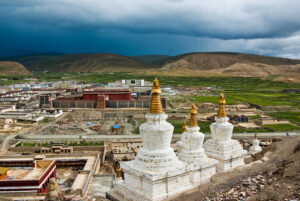

“Sakya Buddha,” which refers to Siddhartha Gautama, more commonly known as the Buddha. Siddhartha Gautama is the founder of Buddhism and is often referred to in the context of his clan name, “Sakya,” hence the term “Sakya Buddha.”
Here is a brief description of Siddhartha Gautama and his significance in Buddhism:
Early Life
- Birth: Siddhartha Gautama was born into the royal family of the Shakya clan in Lumbini, which is now located in modern-day Nepal, around the 5th to 4th century BCE.
- Early Life: He lived a sheltered life of luxury as a prince. According to legend, a prophecy indicated that he would either become a great king or a great spiritual leader. His father, the king, hoping for the former, shielded him from the harsh realities of life.
Renunciation
- Great Renunciation: At the age of 29, after encountering the realities of aging, sickness, death, and a monk in meditation, Siddhartha left his palace, family, and princely responsibilities to seek enlightenment and a solution to human suffering.
Enlightenment
- Meditation and Asceticism: Siddhartha practiced severe asceticism for several years without finding the answers he sought. He then decided on a “Middle Way” between severe asceticism and indulgence.
- Enlightenment: He attained enlightenment under the Bodhi tree in Bodh Gaya, India. He realized profound insights into the nature of existence, the cycle of rebirth (samsara), and the path to liberation (nirvana).
Teaching
- Dharma: After his enlightenment, he became known as the Buddha, or “the Awakened One.” He spent the remainder of his life teaching the Dharma, the path to liberation from suffering.
- Four Noble Truths and Eightfold Path: His teachings centered on the Four Noble Truths — the nature of suffering, its cause, its cessation, and the path leading to its cessation. The Eightfold Path provides ethical and mental development guidelines.
Legacy
- Spread of Buddhism: Buddhism spread throughout Asia and later to the rest of the world, adapting to and influencing many cultures.
- Impact: Today, Buddhism is a major world religion, with diverse traditions and practices but unified by the foundational teachings of the Buddha.
The term “Sakya Buddha” emphasizes his origins from the Sakya clan, highlighting his princely heritage before his transformation into a spiritual leader whose teachings have influenced millions across centuries.